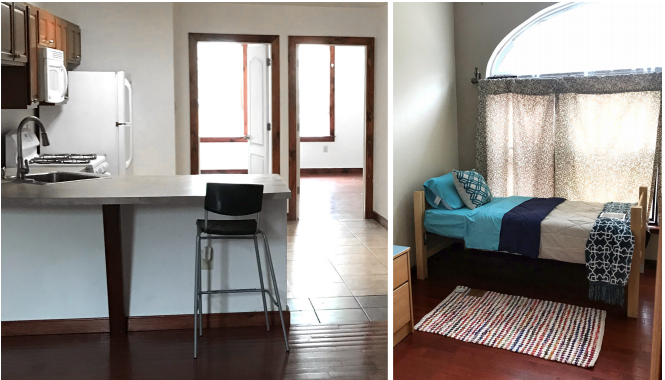
During his late teenage years, Julian* lived in foster care under the Pennsylvania Department of Human Services and experienced bouts of homelessness.
While living on the streets, he often sought refuge at Broad Street Ministries, a church and social services hub in Center City, before connecting with the West Philadelphia-based family resources organization Methodist Services, which offers 10 transitional housing units for LGBTQ young people ages 18-21 in its Quads on Lancaster supportive housing program.
“Before I came here, I wasn’t doing the right things in life. I was able to graduate high school, go to college, able to obtain a job, do a lot of advocacy work with the City of Philadelphia,” said Julian, a 21 year old who is bisexual. “The program helped me … save my money, helped me find a new place,” he added.
Julian is one of a handful of young LGBTQ Philadelphians preparing to graduate from the Quads on Lancaster housing initiative, which caps participation at two-year stints or when a participant ages out of the program. With the inaugural two-year cycle closing as the program enters its third year, five slots are available at the three-story University City house where participants live. The organization is also building a waitlist.
Each floor of the lodging is outfitted with a kitchen, laundry room, two bathrooms and shared space. Participants receive a 30-day supply of food and toiletries upon arrival, along with fully-furnished bedrooms with blankets, a bed, dresser and closet. The program takes a hands-on, family-oriented approach in which residents are treated by staff “like their our children,” said Monica Mason, the youth life coach at Methodist Services who oversees the initiative with Lead Youth Coordinator Jonnelle Taylor.
“Some of them fear leaving, but we try to work through it, going to apartments with them, going to the bank with them, like a mother or father would do,” Mason added, “because we know that they’re not going away to college and then coming back home. They’re off on their own.”
Together, Mason and Taylor started the DHS-funded program, selected the first candidates and decorated the home.
“We literally birthed it,” Taylor said.
Folks eligible for the program are LGBTQ residents of Philadelphia County who are experiencing homelessness and have a foster placement history with DHS. They also must qualify for services through the city’s Achieving Independence Center, which offers social services to people ages 14-21 who are or have been in foster care and demonstrate potential to live independently during interviews with AIC and Methodist Services staff. Via collaboration with AIC, Quads on Lancaster participants learn life skills and receive referrals to other organizations for health services, education resources and other needs, Mason said.
While Taylor, Mason and a team of residential monitors keep an open-door policy and maintain constant communication with program participants, residents of the West Philadelphia neighborhood look out for the young people too, Taylor said. She added that one LGBTQ-identifying neighbor once told Methodist Services staff that having the program participants around brought them out of their own shell because “nobody ever understood [them]” before.
“It’s amazing just to see the youth coming in and out of the door and coming with their problems, and I always tell them that their past is not their future,” Taylor told PGN. “You don’t have to dwell on what happened to you years ago or growing up. We try to not solely focus on that while they’re here.”
A 2017 report by Chapin Hall at the University of Chicago found that LGBTQ young people have a 120-percent higher risk of experiencing homelessness than their heterosexual, cisgender peers. Queer folks also account for 40 percent of youth experiencing homelessness, despite representing only 7 percent of the country’s overall youth population, according to True Colors United, an organization dedicated to finding solutions to queer homelessness.
While not every discharge from the Quads on Lancaster program has been a success story, Methodist Services stays in touch with previous participants, Taylor said. One of the most rewarding aspects of the initiative, she added, is speaking to residents about their diverse life experiences, offering advice and watching them grow.
“At the end of the day, they’re still teens, and they’re trying to figure out life,” Taylor said.
“That’s what our whole program is about: letting them be free to be open, be honest,” Mason said, adding that what participants “didn’t get at home, they’re getting here.”
For Julian, Quads on Lancaster stands out from other LGBTQ services in Philadelphia because of how it creates a “family bond” — both with Methodist Services staff and the other queer residents in the house. Each week, program participants gather for a life skills meeting, focusing on tasks such as laundry. This is where Julian learned to separate his dark and light clothes while doing laundry, he told PGN.
Living together with other members of the LGBTQ community is beneficial, Julian said, because many young people are scared to talk about their sexuality or don’t have friends who are queer and can relate to their experiences.
“We help each other by focusing on one another and connecting with each other. … When we connect with people, we can offer other resources [to] each other,” he said.
*Name has been changed.
Those interested in joining Methodist Services’ LGBTQ Quads on Lancaster program can contact Jonnelle Taylor at [email protected] or Monica Mason at [email protected].
